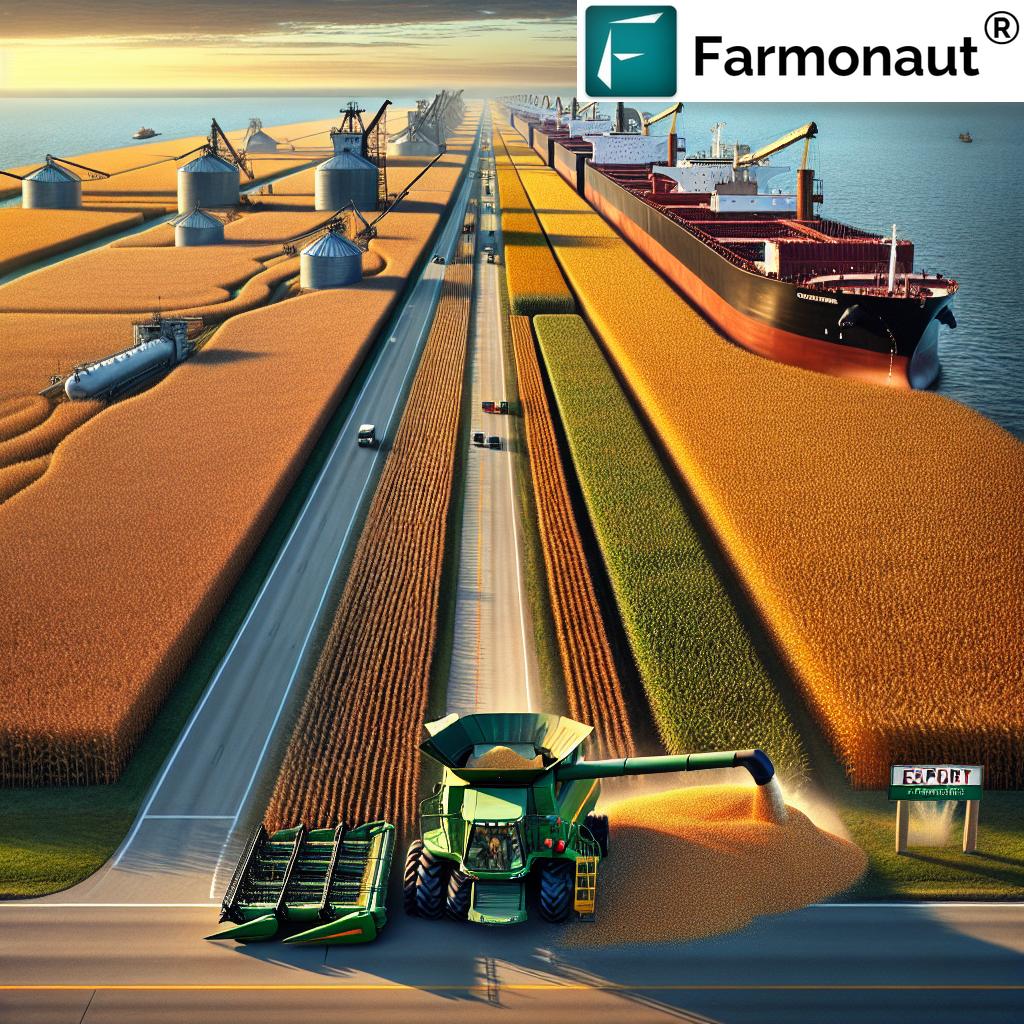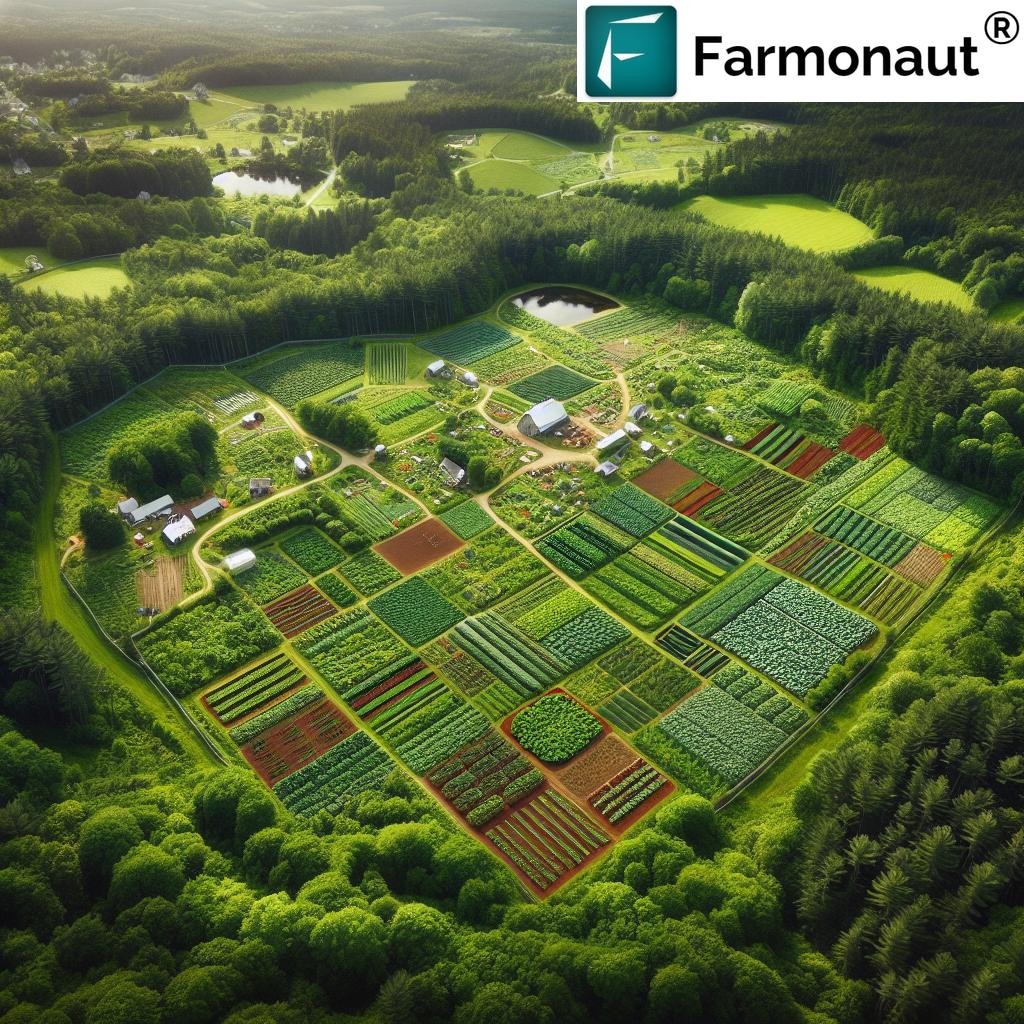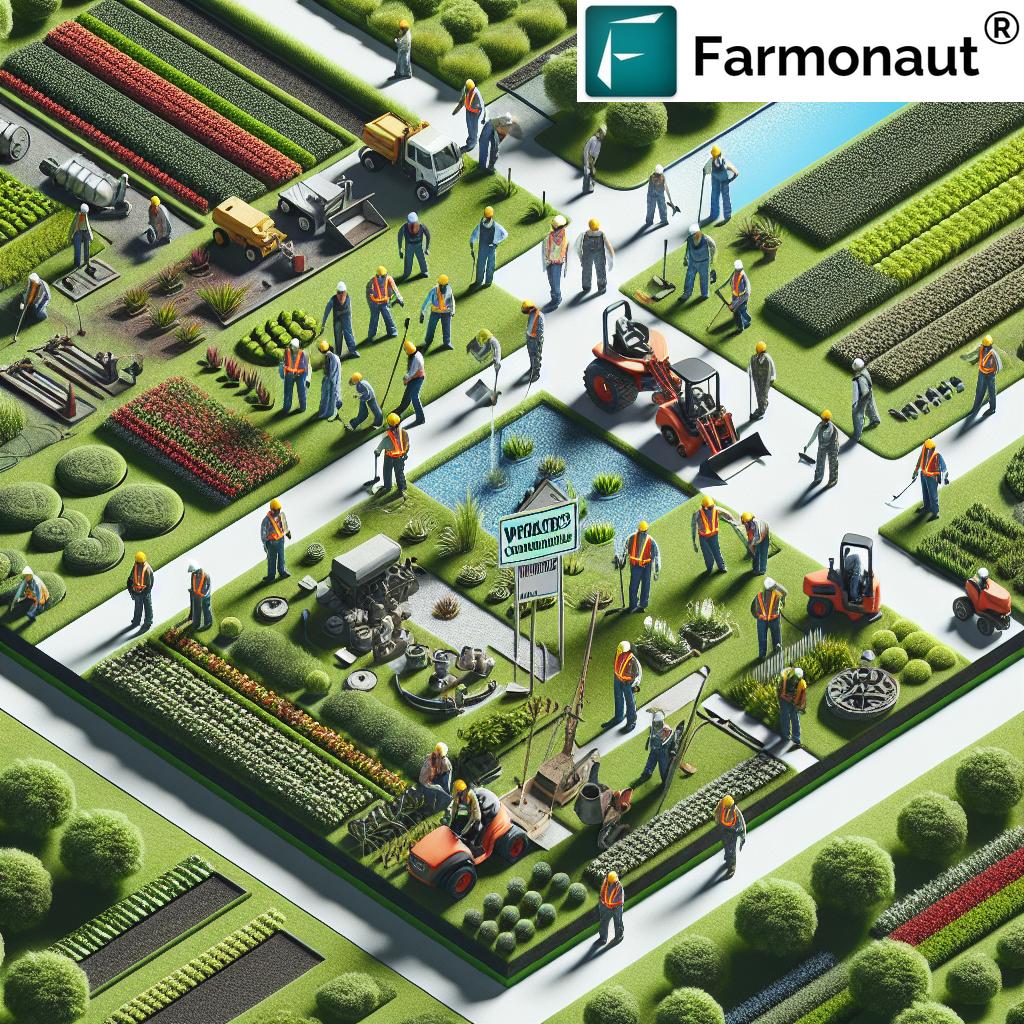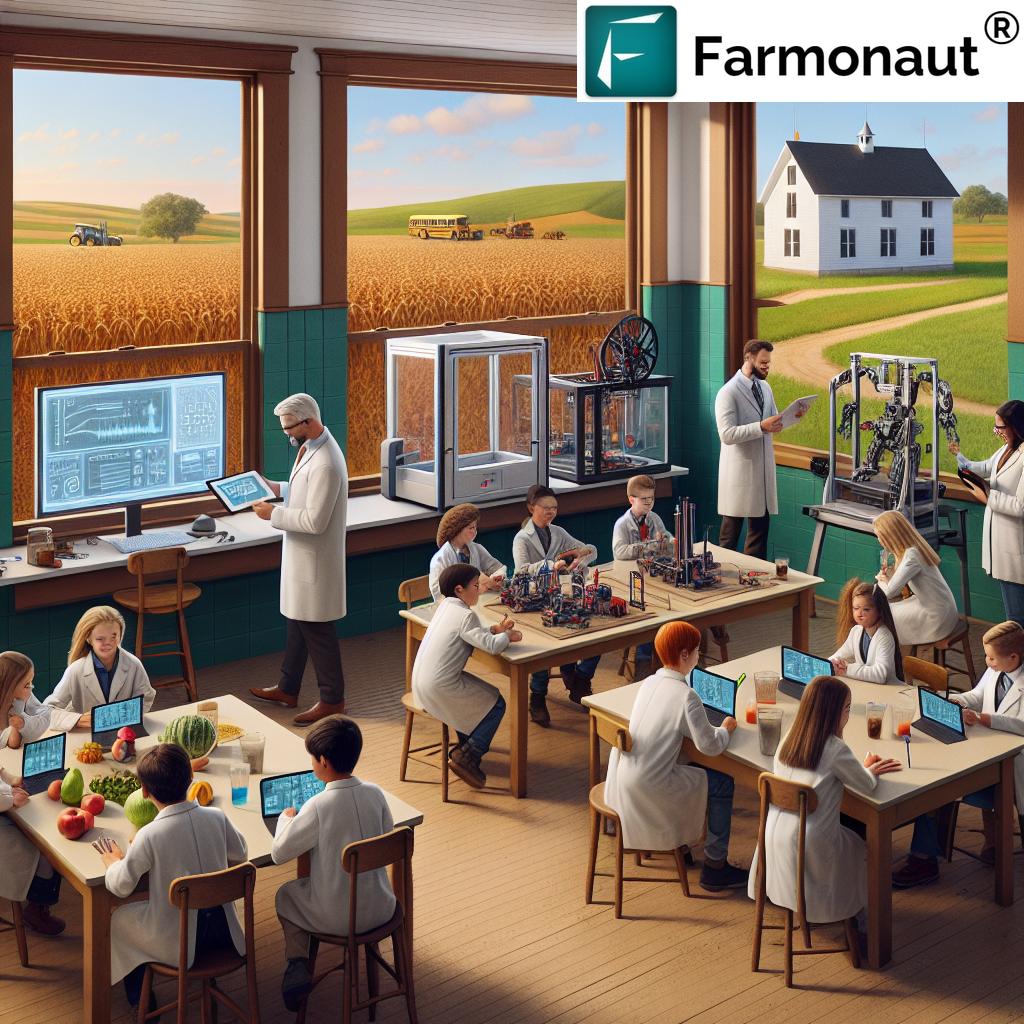Waterloo’s $32 Million Bond Sale: Reshaping Urban Development and Community Priorities in Iowa
“Waterloo, Iowa approved $32 million in bonds, including $28.6 million for urban renewal and $3.61 million for City Hall relocation.”
In the heart of America’s heartland, Waterloo, Iowa, is embarking on a transformative journey that promises to reshape its urban landscape and redefine community priorities. We at Farmonaut, as advocates for innovative agricultural solutions and sustainable development, are closely watching this unfolding story of municipal ambition and financial strategy. The recent approval of over $32 million in bonds by the Waterloo City Council marks a significant milestone in the city’s efforts to stimulate economic growth and revitalize key areas within the Cedar Falls region.
Understanding Waterloo’s Bond Sale: A Financial Catalyst for Change
The City Council’s decision to approve this substantial bond sale is a testament to Waterloo’s commitment to progress and its confidence in future economic prospects. Let’s break down the components of this financial maneuver and explore its potential impact on the community:
- A $28.6 million taxable general obligation urban renewal bond
- A $3.61 million bond specifically for City Hall relocation
These financial instruments are not mere numbers on a balance sheet; they represent Waterloo’s aspirations for a brighter, more prosperous future. The urban renewal bond, in particular, signals a bold move towards revitalizing aging infrastructure and breathing new life into areas that have long awaited rejuvenation.
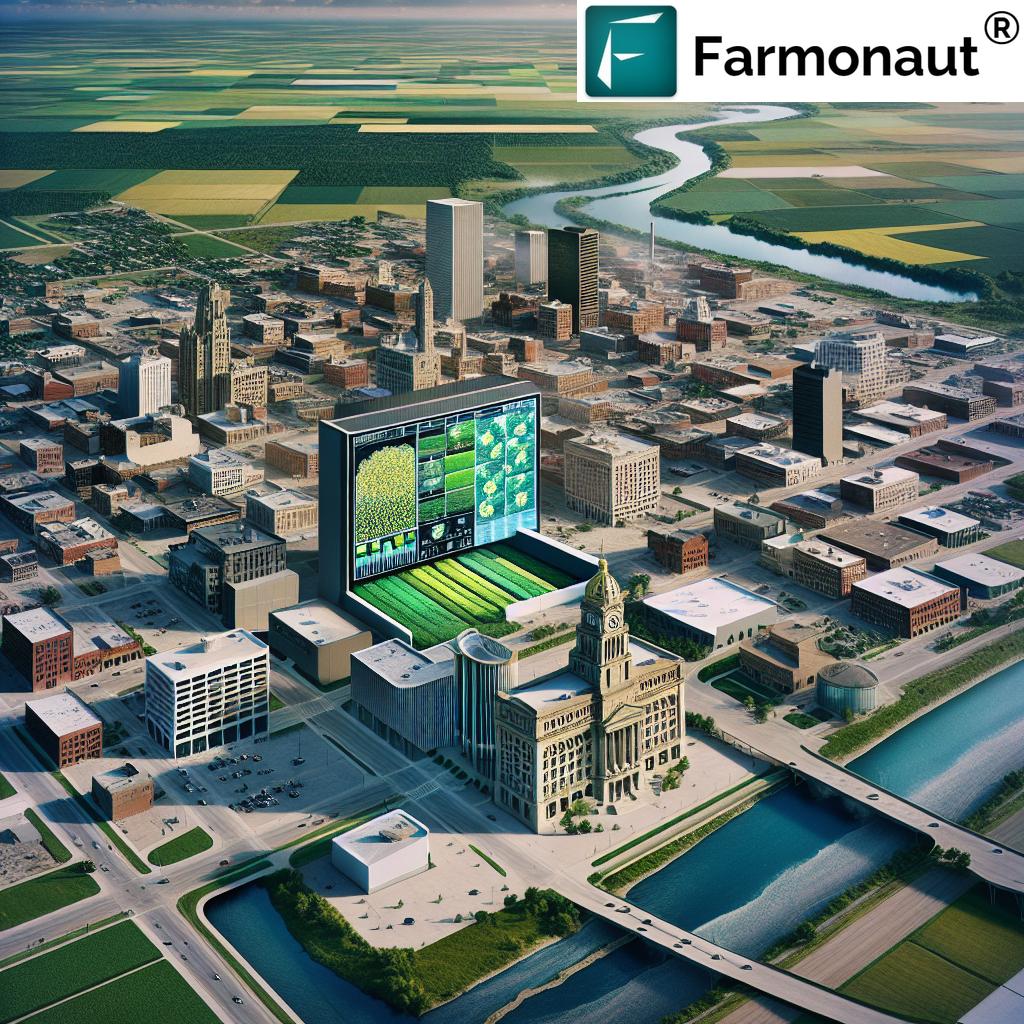
The Significance of Waterloo’s Aa2 Bond Rating
“Waterloo’s Aa2 bond rating from Moody’s Investment Service reflects strong municipal debt management and financial stability in the city.”
The reaffirmation of Waterloo’s Aa2 bond rating by Moody’s Investment Service is a crucial element in this financial narrative. This rating, which the city has maintained for nearly two decades, speaks volumes about Waterloo’s fiscal responsibility and stability. For potential investors and the community alike, this rating serves as a beacon of trust, indicating that the city is well-positioned to meet its financial obligations.
The Aa2 rating brings several advantages to Waterloo:
- Lower borrowing costs, as investors perceive less risk
- Increased attractiveness to businesses considering relocation or expansion
- A strong foundation for future economic development initiatives
As we at Farmonaut understand the importance of financial stability in driving innovation and growth, we recognize the significance of this rating in Waterloo’s journey towards urban renewal and economic revitalization.
Breaking Down the Bond Sale: Numbers and Implications
To provide a clearer picture of Waterloo’s bond sale and its potential impact, we’ve compiled a comprehensive table that outlines the key aspects of this financial move:
| Bond Type | Amount (in millions) | Purpose | Expected Impact |
|---|---|---|---|
| Taxable General Obligation Urban Renewal Bond | $28.6 | Redevelopment of Crossroads Mall, City Hall relocation, Northeast industrial area improvements | Urban revitalization, increased commercial activity, job creation |
| City Hall Relocation Bond | $3.61 | Relocation of City Hall to former Courier building | Improved government services, potential for repurposing old City Hall site |
| Job Creation (estimated) | N/A | N/A | 500-1000 new jobs over 5 years |
| Infrastructure Improvement Value (estimated) | $50 | N/A | Enhanced public spaces, modernized facilities |
| Projected Economic Growth (estimated percentage) | N/A | N/A | 2-3% annual increase in local GDP |
This table illustrates the multifaceted approach Waterloo is taking to stimulate growth and improve urban infrastructure. The substantial investment in urban renewal is expected to catalyze job creation, enhance public spaces, and foster a more vibrant local economy.
Urban Renewal: Transforming Waterloo’s Landscape
The $28.6 million taxable general obligation urban renewal bond is set to fund several transformative projects across Waterloo. These initiatives are not just about physical changes to the city’s landscape; they represent a commitment to creating a more dynamic, livable, and economically robust community.
- Crossroads Mall Redevelopment: This project aims to breathe new life into an aging commercial center, potentially creating a mixed-use space that could serve as a hub for retail, dining, and community activities.
- City Hall Relocation: Moving City Hall to the former Courier building is more than a change of address. It’s an opportunity to modernize government operations and potentially repurpose the old City Hall site for new development.
- Northeast Industrial Area Improvements: Enhancing this area could attract new businesses, create jobs, and strengthen Waterloo’s industrial base.
These projects collectively represent a forward-thinking approach to urban planning and economic development. By investing in these areas, Waterloo is laying the groundwork for sustained growth and improved quality of life for its residents.
Community Voices: Concerns and Aspirations
While the bond sale represents a significant step forward for Waterloo, it’s crucial to acknowledge the diverse voices within the community. Public comments collected during this process reveal a range of concerns and aspirations:
- Political Appointments: Some residents have expressed concerns about the process and implications of certain political appointments.
- Social Services: There’s a call for improved services for the homeless population, highlighting the need for comprehensive community support.
- Local Pharmacy Support: Community members have voiced the importance of supporting local pharmacies, especially in the face of challenges posed by pharmacy benefit managers (PBMs).
- Economic Challenges: Families are grappling with rising costs and economic uncertainties, emphasizing the need for inclusive growth strategies.
These concerns underscore the complex tapestry of issues that Waterloo, like many American cities, must navigate. As the city embarks on its urban renewal journey, addressing these community priorities will be crucial for ensuring equitable and sustainable development.
The Role of Technology in Urban and Rural Development
As Waterloo charts its course for urban renewal, it’s worth considering how technological innovations can complement these efforts, especially in bridging the urban-rural divide. At Farmonaut, we believe that advancements in agricultural technology can play a significant role in supporting both urban and rural economies.
Our satellite-based crop monitoring solutions, for instance, offer farmers in Iowa and beyond the ability to optimize their agricultural practices, potentially increasing yields and reducing resource wastage. This type of precision agriculture not only benefits individual farmers but can also contribute to the overall economic health of regions like Cedar Falls and Waterloo.
Furthermore, the integration of technologies like blockchain for supply chain traceability and AI-driven advisory systems can create new opportunities for innovation and employment in both urban and rural settings. As Waterloo invests in its urban infrastructure, complementary investments in agricultural technology could help create a more resilient and diversified local economy.
Financial Implications and Future Outlook
The approval of these bonds comes with significant financial implications for Waterloo. Let’s break down some key figures:
- The $28.6 million urban renewal bond was awarded at a true interest rate of 5.02%
- Repayment is scheduled to conclude by the end of fiscal year 2044
- Total repayment, including interest, is estimated at $42.93 million
- The $3.61 million City Hall relocation bond carries a lower interest rate of 3.85%
- Total repayment for this bond is projected at around $5.25 million
These figures highlight the long-term commitment Waterloo is making to its future. With about $212 million in outstanding debt following these sales, the city’s financial management will be crucial in the coming years.
Sustainable Development: Balancing Growth and Resources
As Waterloo embarks on this ambitious urban renewal project, the principles of sustainable development should be at the forefront. This is where innovative agricultural technologies, like those offered by Farmonaut, can play a crucial role. Our solutions for precision agriculture and resource management align well with the goals of sustainable urban development:
- Efficient Resource Use: Our satellite-based monitoring can help optimize water and fertilizer use in urban green spaces and surrounding agricultural areas.
- Environmental Monitoring: Technologies for tracking carbon footprints can assist Waterloo in measuring and reducing its environmental impact as it grows.
- Smart City Integration: Data from agricultural tech can be integrated into smart city initiatives, creating a more holistic approach to urban-rural planning.
Explore Farmonaut’s API for integrated solutions
By incorporating such technologies, Waterloo can ensure that its urban development goes hand-in-hand with sustainable practices, creating a model for other cities to follow.
Community Engagement and Participatory Planning
The success of Waterloo’s urban renewal efforts will largely depend on community engagement and participatory planning. As the city moves forward with its redevelopment projects, it’s crucial to maintain open channels of communication with residents, local businesses, and community organizations. Here are some strategies that could enhance community involvement:
- Public Forums: Regular town hall meetings to discuss project progress and gather feedback.
- Digital Engagement Platforms: Utilizing online tools to collect ideas and opinions from a broader range of residents.
- Collaborative Design Workshops: Involving citizens in the design process for public spaces and community facilities.
- Transparency Initiatives: Regular updates on bond expenditures and project milestones to maintain public trust.
By fostering a sense of ownership and involvement among residents, Waterloo can ensure that its urban renewal projects truly reflect the needs and aspirations of the community.

Economic Diversification and Innovation
While urban renewal is a key focus, Waterloo’s long-term economic resilience will depend on diversification and fostering innovation. The city could consider:
- Tech Incubators: Establishing spaces to nurture local startups and attract tech talent.
- Agritech Partnerships: Collaborating with companies like Farmonaut to create synergies between urban development and agricultural innovation.
- Workforce Development Programs: Investing in education and training to prepare residents for jobs in emerging sectors.
- Green Economy Initiatives: Encouraging businesses focused on sustainability and renewable energy.
Discover how Farmonaut’s API can drive innovation in your area
By diversifying its economic base, Waterloo can build resilience against future economic shocks and create a more dynamic local economy.
Addressing Social Equity in Urban Development
As Waterloo moves forward with its urban renewal projects, it’s crucial to ensure that the benefits of these investments are equitably distributed across the community. Some key considerations include:
- Affordable Housing: Incorporating affordable housing options within new developments to maintain socioeconomic diversity.
- Public Transportation: Enhancing public transit to ensure all residents can access new amenities and job opportunities.
- Community Services: Equitable distribution of public services and facilities across different neighborhoods.
- Local Business Support: Programs to help local businesses, particularly in underserved areas, benefit from the city’s growth.
By prioritizing social equity, Waterloo can ensure that its urban renewal efforts contribute to a more inclusive and cohesive community.
Environmental Considerations in Urban Renewal
Urban renewal presents an opportunity for Waterloo to incorporate environmentally friendly practices into its development plans. This aligns well with the sustainable agriculture practices that we at Farmonaut advocate for. Some environmental considerations for Waterloo’s urban renewal include:
- Green Building Standards: Implementing energy-efficient building codes for new constructions and renovations.
- Urban Green Spaces: Increasing parks and green areas to improve air quality and provide recreational spaces.
- Stormwater Management: Implementing systems to reduce runoff and improve water quality.
- Renewable Energy Integration: Incorporating solar panels and other renewable energy sources in public buildings and encouraging their use in private developments.
These environmental initiatives can help Waterloo build a more sustainable and resilient urban environment, setting a standard for other cities in Iowa and beyond.
The Role of Data in Urban Planning and Agriculture
In today’s digital age, data-driven decision-making is crucial for both urban planning and agriculture. Waterloo’s urban renewal efforts can benefit greatly from the strategic use of data, much like how Farmonaut’s satellite-based solutions provide valuable insights for farmers. Here’s how data can play a role in Waterloo’s development:
- Traffic Flow Analysis: Using data to optimize traffic patterns and reduce congestion in newly developed areas.
- Energy Usage Monitoring: Tracking energy consumption to implement more efficient systems in public buildings and spaces.
- Demographic Trends: Analyzing population data to ensure new developments meet the evolving needs of the community.
- Economic Impact Assessment: Using data to measure the economic effects of urban renewal projects and make informed decisions for future investments.
By leveraging data effectively, Waterloo can make more informed decisions about its urban development, much like how farmers use Farmonaut’s data to optimize their agricultural practices.
Connecting Urban and Rural Development
While Waterloo focuses on urban renewal, it’s important to consider the interconnectedness of urban and rural areas. As a company dedicated to agricultural innovation, we at Farmonaut see great potential in bridging urban development with rural agricultural advancements. Here are some ways Waterloo could foster urban-rural connections:
- Farmers Markets: Expanding spaces for local farmers to sell directly to urban consumers, supporting both rural agriculture and urban food access.
- Agritourism Initiatives: Promoting visits to nearby farms, vineyards, or orchards to boost rural economies and educate urban residents about agriculture.
- Urban Agriculture Programs: Implementing community gardens or vertical farming projects within the city to connect urban residents with food production.
- Agricultural Technology Hubs: Creating spaces within the city for agritech companies to showcase innovations that benefit both urban and rural areas.
By fostering these connections, Waterloo can create a more integrated and resilient regional economy.
Looking to the Future: Waterloo’s Path Forward
As Waterloo embarks on this ambitious journey of urban renewal and community development, the path forward is filled with both challenges and opportunities. The $32 million bond sale represents more than just a financial transaction; it’s a statement of intent and a commitment to the future of this vibrant Iowa city.
Key aspects to watch as Waterloo moves forward include:
- The tangible impacts of urban renewal projects on local economic indicators
- Community response and engagement with new developments
- The city’s ability to balance growth with fiscal responsibility
- Innovations in integrating technology into urban planning and management
- Progress in addressing community concerns, from social services to local business support
As advocates for technological innovation in agriculture, we at Farmonaut are excited to see how cities like Waterloo embrace forward-thinking approaches to development. The integration of smart technologies, sustainable practices, and data-driven decision-making in urban planning aligns closely with the principles we champion in the agricultural sector.
Conclusion: A New Chapter for Waterloo
Waterloo’s $32 million bond sale marks the beginning of a new chapter in the city’s history. It’s a bold step towards revitalization, economic growth, and community development. As the city moves forward with its urban renewal projects, the focus on balancing progress with community needs, environmental sustainability, and fiscal responsibility will be crucial.
The success of this initiative will depend not just on the physical transformations of the city’s landscape, but on how well it addresses the diverse needs and aspirations of its residents. From improving social services to supporting local businesses, from enhancing public spaces to fostering innovation, Waterloo has the opportunity to create a model of inclusive and sustainable urban development.
As we at Farmonaut continue to innovate in the field of agricultural technology, we look forward to seeing how cities like Waterloo integrate smart, sustainable practices into their urban fabric. The future of urban development lies in creating synergies between technology, community engagement, and sustainable practices – a vision that aligns closely with our mission in the agricultural sector.
Waterloo’s journey of transformation is just beginning, and it promises to be an exciting one to watch. As the city builds for the future, it has the potential to not only reshape its own urban landscape but also to inspire other communities across Iowa and beyond.
FAQ Section
- Q: What is the total amount of bonds approved by Waterloo’s City Council?
A: The City Council approved over $32 million in bonds, including a $28.6 million taxable general obligation urban renewal bond and a $3.61 million bond for City Hall relocation. - Q: What is Waterloo’s current bond rating?
A: Waterloo maintains an Aa2 bond rating from Moody’s Investment Service, reflecting strong municipal debt management and financial stability. - Q: What are the main projects funded by these bonds?
A: The bonds will fund the redevelopment of Crossroads Mall, City Hall relocation to the former Courier building, and improvements in the city’s northeast industrial area. - Q: How long is the repayment period for these bonds?
A: The repayment is scheduled to conclude by the end of fiscal year 2044. - Q: What is the significance of Waterloo’s Aa2 bond rating?
A: The Aa2 rating indicates low risk for investors, potentially leading to lower borrowing costs and increased attractiveness for businesses considering relocation or expansion. - Q: How might these urban renewal projects impact the local economy?
A: These projects are expected to create jobs, enhance public spaces, attract new businesses, and potentially increase the local GDP by 2-3% annually. - Q: What are some of the community concerns regarding these developments?
A: Community members have expressed concerns about political appointments, social services for the homeless, support for local pharmacies, and economic challenges faced by families. - Q: How is Waterloo addressing environmental considerations in its urban renewal plans?
A: While specific details are not provided, cities typically consider green building standards, urban green spaces, stormwater management, and renewable energy integration in such projects. - Q: What role can technology play in Waterloo’s urban development?
A: Technology can assist in areas such as traffic flow analysis, energy usage monitoring, demographic trend analysis, and economic impact assessment for more informed urban planning decisions. - Q: How can residents stay informed and involved in Waterloo’s urban renewal process?
A: Residents can typically stay informed through public forums, digital engagement platforms, collaborative design workshops, and transparency initiatives implemented by the city.






